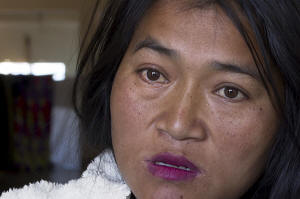Tens of thousands displaced by ethnic violence in northeast India suffer
squalid conditions in camps
 Send a link to a friend
Send a link to a friend
 [December 23, 2024]
By RISHI LEKHI [December 23, 2024]
By RISHI LEKHI
KANGPOKPI, India (AP) — Phalneivah Khonsai ran for her life when
violence struck her neighborhood in India's restive northeast, carrying
just the bare essentials in the hope that she and her family could
return soon.
Khonsai, her husband and three children left behind their house, which
was torched by a mob, and made for the hills, where thousands of people
from their community headed for safety.
That was in May last year. Almost 19 months later, Khonsai, 35, is still
away from home, living in a government building that was turned into a
relief center with squalid conditions and little privacy.
The relief camp is in Kangpokpi, about 50 kilometers (30 miles) from
Imphal, the capital of India's northeastern Manipur state, which has
been wracked by ethnic violence since last year. In the building’s damp
and dark interior, fabric partitions separate at least 75 families like
hers driven away from their homes.
“It is very difficult to live here,” Khonsai said, as women went about
their daily chores such as washing clothes and dishes.
The violent ethnic clashes erupted last year between the majority Meitei
community and the minority Kuki-Zo tribes in Manipur. The conflict has
claimed more than 250 lives and displaced at least 60,000 people.

The state remains divided into two ethnic zones, one controlled by the
Meiteis and the other by the Kuki-Zo community. The factions have formed
armed militias that patrol roads checking for signs of their rivals.
Borders and buffer zones guarded by security forces separate the two
regions. Youths spend nights guarding vulnerable villages.
Khonsai, a Kuki, said the struggles of living in a relief center are
taking a toll on the family's health but they can't go back home because
they fear for their lives.
“If we go back, they will kill us. There is no hope for going back,” she
said.
The Meiteis, who are predominantly Hindus, live in the Imphal Valley and
nearby districts, while the Kuki-Zos live in hilly areas. The violence
began last year when Meiteis demanded that they be listed by the
government as a Scheduled Tribe, which would bring them more benefits
such as quotas in jobs and educational institutions. That categorization
would also bar non-Meiteis from buying land in the Meiteis' strongholds
in the Imphal Valley.
The Kukis opposed this, saying such benefits should be given only to
tribal groups that are less developed economically and less educated.
Soon, protests by both sides turned violent. Each side rampaged through
villages, torching houses, massacring civilians and driving tens of
thousands from their homes. Violence had receded in recent months,
except for occasional flareups, but returned in November when 10 people
were killed by paramilitary soldiers.

[to top of second column]
|

A Kuki tribal woman Phalneivah Khonsai, 35, talks to Associated
Press in a relief camp in Kangpokpi, Manipur, Monday, Dec. 16, 2024.
Khonsai ran for her life when violence struck her neighbourhood in
India's restive northeast, carrying just the bare essentials in the
hope that her family would return soon. Khonsai, her husband and
three children left behind their house, which was torched by a mob,
and made for the hills where thousands of people from their
community were heading for safety. (AP Photo/Rishi Lekhi)

The Kuki-Zo community has been particularly hit hard by the
violence. They accuse state Chief Minister N. Biren Singh of siding
with the Meiteis and have sought his removal. They now seek federal
rule over the state and administrative autonomy for the community.
Singh, a Meitei, has denied the accusations. His administration says
people from the hill tribes — who share ethnic lineage with
Myanmar’s Chin tribe — are using illegal drugs to finance a war
against the Hindu community. Manipur’s government is led by Prime
Minister Narendra Modi’s Hindu nationalist Bharatiya Janata Party.
The displacement crisis has, however, impacted both communities.
While most of the displaced from the Kuki-Zo community have gone to
the hills, the Meiteis have taken shelter in refugee camps in Imphal.
The mistrust between the two communities is far from over, with
people from each side unable to venture into the other’s zone.
Yengsom Junksom Memi, a Meitei, used to live in Kangpokpi until
attackers rampaged her home and forced her family to run for their
lives. Memi first took refuge in a police station before moving to a
relief center in Imphal where she lives with 600 other displaced
Meiteis. She said her house has been taken over by the attackers.
“We have no future left. It is difficult to even manage food in the
morning and evening,” Memi said.
Ngamminlun Kipgen, spokesperson for the Committee on Tribal Unity,
which represents Kukis, blamed the federal government for failing to
end the violence.

“I think the prime minister needs to intervene," Kipgen said.
India's opposition parties have been urging Modi to visit Manipur.
Modi has not visited the state since the violence started but has
instructed his home minister, Amit Shah, to find a solution.
Kipgen said a division of the state into two separately administered
parts, one for the Kukis and the other for Meiteis, could calm the
situation.
“The nation must understand that the Kukis and the Meiteis for the
time being are not able to live together, so the state or the
central government should not force both communities at this
critical juncture to come together,” Kipgen said.
All contents © copyright 2024 Associated Press. All rights reserved |